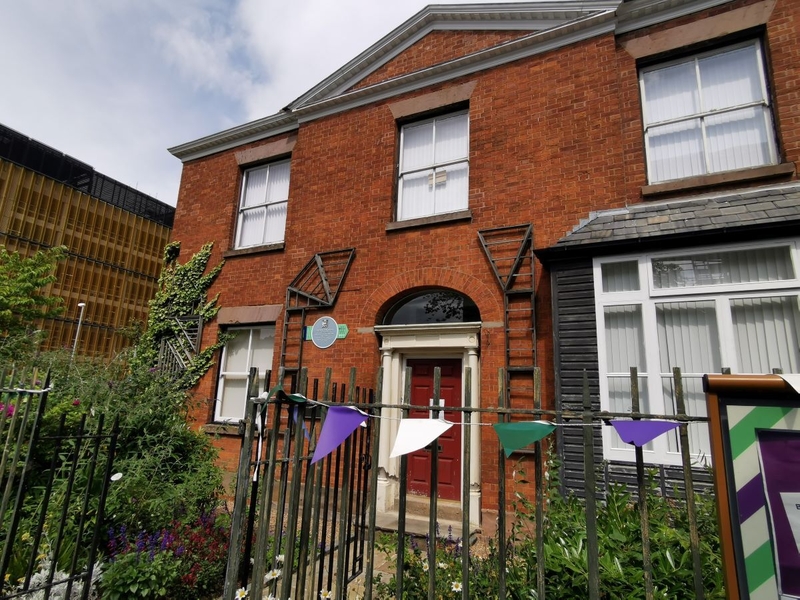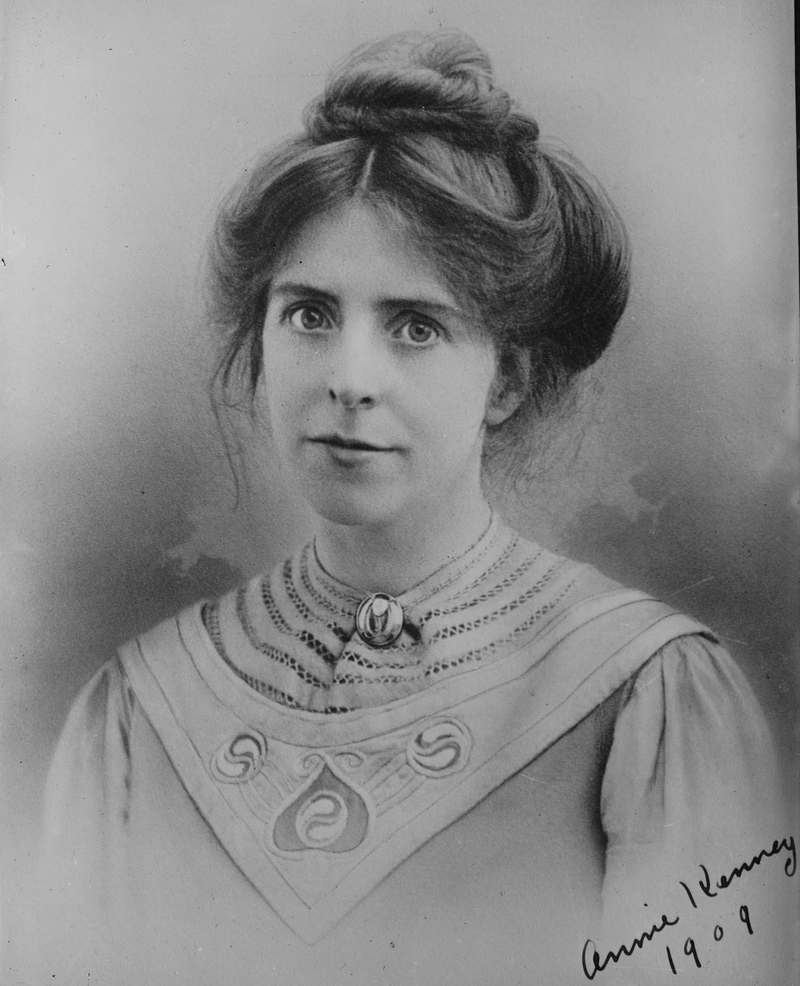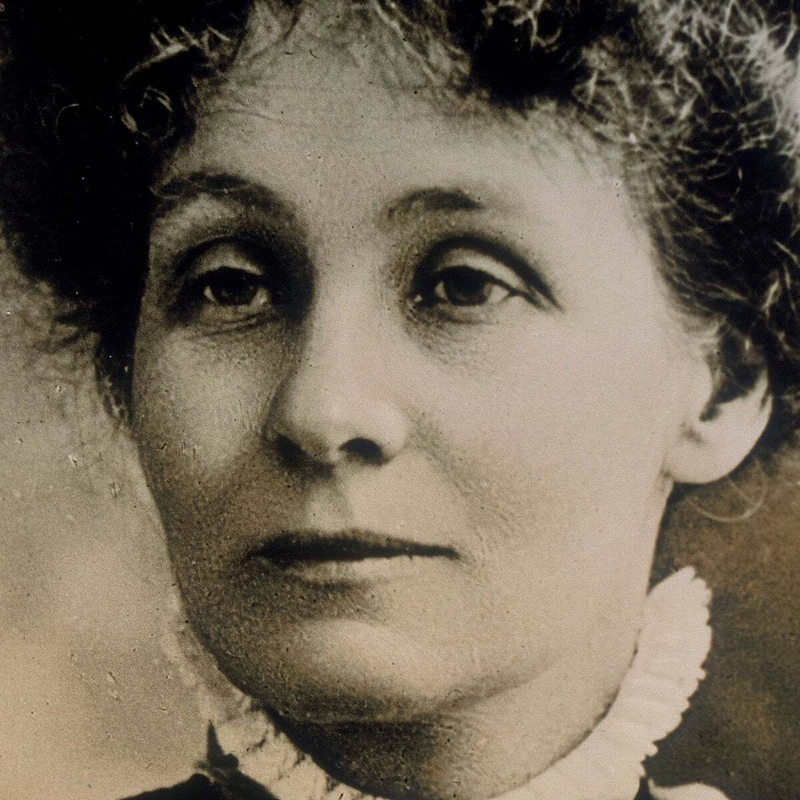October 10 and October 13 are key dates in the national battle for the women's vote
October is an important month for British women and politics. And the focus is on Manchester.
On Friday 9 October Emmeline Pankhurst asked a group of women round for a meeting at her house at Nelson Street in Manchester. She was a member of the Independent Labour Party but didn’t think it was pushing the cause of female suffrage sufficiently.
She said: “Women, we must do the work ourselves. We must have an independent women’s movement. Come to my house tomorrow and we’ll arrange it.”
Christabel was determined to be arrested. “I shall assault you,” she retorted
So it was that on Saturday 10 October 1903 the Women’s Social and Political Union (WSPU) was formed. The modest house were this significant political moment occurred still stands, totally out-of-place, surrounded by the buildings of the vast Manchester University NHS Hospital Trust. It's now called the Pankhurst Centre and can still be visited. It includes a re-creation of the room in which the WSPU was founded.
Back to the story.
The following year, 1904, the WSPU convinced a sympathetic male MP, Bamford Slack, to present a women’s suffrage bill to the House of Commons but this was talked out. Following that disappointment the WSPU decided to focus on one policy and one policy alone, getting the vote, other social concerns for women could wait.
On Friday 13 October, 1905, an opportunity arose for direct action. On this date the Liberal Party were meeting at the Free Trade Hall, now the Edwardian Hotel. Everybody knew the party would form the next government at the January 1906 General Election as the ruling Conservative Party was tearing itself apart particularly over foreign policy. Quelle surprise.

The WSPU arrived at the meeting to ask a simple question. As Emmeline Pankhurst wrote: ‘We made a banner with the words ‘Will the Liberal Party Give Votes for Women’. We were to let this down over the gallery rail (but) it was impossible to get the seats we wanted. We cut out and made a small banner with the three-word inscription, ‘Votes for Women’. Thus accidentally, came into existence the slogan of the suffrage movement.’
During the meeting Christabel Pankhurst, one of Emmeline’s daughters, thrust fellow campaigner Annie Kenney forward to ask the question that had been on the untrimmed banner.
The question was ignored. It was asked again.
‘Annie Kenney was dragged down by men sitting near, one of the stewards put a hat over her face,’ wrote Sylvia Pankhurst, another of Emmeline’s daughters. ‘Annie stood on a chair to ask again. (Eventually) stewards and policemen dragged Annie and Christabel from the hall.
‘Christabel was determined to be arrested. “I shall assault you,” she retorted when they pinioned her. Yet still she was not arrested.
‘Outside in South Street she declared they must hold a meeting and her desire was attained; they were now arrested and taken to the Town Hall.’
Christabel and Annie refused to pay their fines and were imprisoned. It’s said Winston Churchill, who had been at the Free Trade Hall and would become an MP for Manchester at the 1906 election, offered to pay their fines for them, but they refused that offer as well.
Thus, the women achieved what they had set out to achieve: notoriety. Their cause, the single goal of gaining the female vote, made the newspapers.

Much later in the campaign Emmeline Pankhurst gave a speech articulating the Suffragettes principle behind their protests.
She said: “You have two babies very hungry and wanting to be fed. One baby is a patient baby, and waits indefinitely until its mother is ready to feed it. The other baby is an impatient baby and cries lustily, screams and kicks and makes everybody unpleasant until it is fed. Well, we know perfectly well which baby is attended to first. That is the whole history of politics. You have to make more noise than anybody else, you have to make yourself more obtrusive than anybody else, you have to fill all the papers more than anybody else, in fact you have to be there all the time and see that they do not snow you under.”

Four months after the Free Trade Hall protest the Daily Mail described the WPSU as ‘suffragettes’. This was intended as an insult: an attempt to diminish the cause. The women loved it and adopted the word suffragette, contrasting it with the more general word suffragist denoting anyone female or male who wants the vote. As the WSPU’s magazine punned: ‘Suffragist jist wants the vote, while the Suffragette means to get it.’ Suffragette was pronounced with a hard 'g'.
Women finally gained the vote in December 1918. That right should have arrived, as should have Irish Home Rule, in December 1914, but in August of that year Germany had invaded Belgium and Britain found itself at war. Legislation was deferred.
It was a mealy mouthed first step in 1918 as it was only women over thirty and with property who were allowed at the polling station. It wouldn’t be until 1928 that women achieved full suffrage parity with men. Still, those two events in Manchester in October 1903 and October 1905 would prove critical in the long campaign to achieving the vote.
If you liked this you might like:
St Ann's Square, why isn't food and drink central
90 photographs of 1960s Manchester
Get the latest news to your inbox
Get the latest food & drink news and exclusive offers by email by signing up to our mailing list. This is one of the ways that Confidentials remains free to our readers and by signing up you help support our high quality, impartial and knowledgable writers. Thank you!

Join our WhatsApp group
You can also get regular updates on news, exclusives and offers by joining the Manchester Confidential WhatsApp group.















